
By June M. Chewning MA
It's such a satisfying experience to finish your workout knowing you have created a calorie deficit. Many clients are trying to manage their weight and want to know "How many calories did I burn in this workout?" In order to answer this commonly asked question, it is important to understand the many factors that affect caloric consumption. This quick study will help you guide your clients to better exercise choices and help you better understand the "skinny" on measuring energy production and intensity, and the variables that affect caloric consumption.

By Sarah B. Manis BA
It's every fitness professional's nightmare: "I know where the muscle is located, I can see the word in my head, but how do I pronounce it? These terms are so unusual." Even physical therapists, presenters and college professors all say the terms differently. What is the correct pronunciation of basic anatomical terminology? In this course, each muscle is represented with its common spelling, phonetic spelling, a picture, the Latin root of the term, and then the muscle is used in a sentence that helps you learn about the muscle. The best part of this course is that you can click on the speaker icon and HEAR and PRACTICE the correct pronunciation. How good is that!
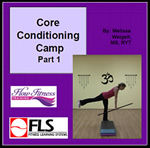
By Melissa Weigelt MS RYT
This multi-media course uses video, text, and pictures to provide you with choreography for a complete core workout. Learn how to teach this workout which includes powerful cardio moves that focus on extreme calorie burning combined with unique strength exercises that will sculpt the body. The workout includes an emphasis on balance training to challenge the core and uses functional and interval training techniques. Have your clients engage multiple muscle groups to maximize energy expenditure and increase post workout caloric burn. Keep your clients coming back for more core with this workout!
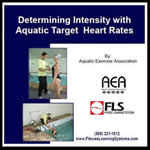
By Aquatic Exercise Association
Improve the quality of your cardiorespiratory workouts for your clients! Learn how to have your clients working in their target heart rate zones to maximize weight loss and effectively improve function. This course provides evidence based methodology and practice for the often confusing guidelines for aquatic heart rate deductions. Generally accepted equations and methods are provided with easy-to-follow explanations and practice equations. After completing this course you will be able to determine and apply aquatic target heart rates for safe and effective exercise intensity.
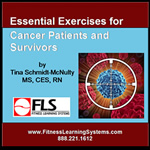
By Tina Schmidt-McNulty MS, RCEP, RN
Cancer is the second leading cause of death in the United States. It is a very serious diagnosis with a multifaceted approach starting from identification all the way through treatment. Cancer patients are now encouraged to exercise during and after treatment. This course includes important information for health-fitness professionals about cancer and exercise guidelines. Videos guide you through a simple exercise progression for clients with cancer or who are cancer survivors. In the search for a cure, physical activity proves a valuable tool in prevention, treatment, and a progressive return to daily living activities. Learn how to embrace this client base and provide safe and effective programming options.
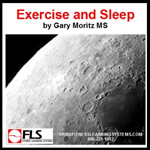
By Gary Moritz MS
Sleep is a fundamental and important human need, but few people know how important it really is. Some people even try to get by with as little sleep as possible. Even so, everyone needs sleep. As a health-fitness professional, you know about the many benefits of regular exercise. You could recite them in your sleep. But did you know that even a single bout of exercise can help improve the quality of sleep? And with that improved sleep comes many additional health benefits. So get ready to add to your list of exercise benefits as we discuss healthy sleep, sleep disorders, and what research has discovered about the effects of exercise upon sleep quality.
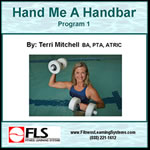
By Terri Mitchell BA, PTA, ATRIC
Hand Me a Handbar is an introduction to safely using buoyant equipment in the water to enhance and add variety to aquatic fitness workouts. Each video shows a basic move, as well as progressions and options for changing the stance or active movement of the legs or arms to add challenge or variety. Several ideas are presented in this course for handbar use. Add spark to your handbar workouts.
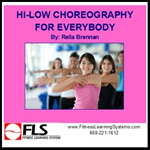
By Rella Brennan ACE, AFAA, AEA, cPT
In this dynamic choreography course, Master Instructor Rella Brennan shows you 15 moves that you can use as building blocks in your own choreography. Safe and effective Hi-Low Choreography shows all moves with a low impact variation, fluid transitions, and great combinations to keep your classes fresh and effective. Learn how to put together several of the moves to get 6 safe combinations that will rock your class, or take it up a notch with Rella's Mega Combinations and see how all of the moves work together to create one great class. Awesome choreography to incorporate into several class formats to keep you fresh!
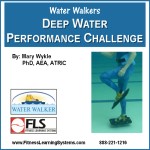
By Mary Wykle PhD, AEA, ATRIC
Add new dimension and variety to your deep water programming. Strap on some Water Walkers and offer advanced programming for your fit clients. Options for Cadence Training and Insanity Intervals are provided. Videos and explanations provided with the exercises, and 2 sample programs included. Feel the benefit of drag resistance to kick up your deep water programming options.
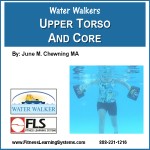
By June M. Chewning MA
Water Walkers aren't just for your feet anymore! This course takes the water walkers off the feet and onto the hands for an upper torso and core workout that is hard to beat. This workout is best performed standing in shallow water with no flotation equipment. Enhance your lower torso water walker workout with some great upper torso and core training options with drag resistance that takes on a whole new dimension. Videos provided for upper torso and core exercises.

By Mary Essert BA ATRIC and Vickie Ramsey RN CPC
As a health-fitness professional, you may encounter clients with Post Polio Syndrome. Exercise is important, but can easily cause or accelerate serious problems. It is imperative to understand how to effectively and safely work with these clients without causing harm to occur or symptoms to re-occur. Although this course focuses on water exercise, the information is valuable to land exercise as well. Techniques to increase range of motion, strength, endurance and relaxation are clearly shown. Videos and text emphasize independence and functional fitness as the goal. Learn important guidelines for how to work with clients with Post Polio Syndrome and learn how to help them "Conserve to Preserve" to improve and maintain quality of life.

By Ana Oriani MA
Take your clients and athletes to a new level of flexibility with Buoyancy Stretches. Learn how to maximize the use of Archimedes' Principle and buoyancy equipment with supine, side, and front working positions. These stretches will enable you to help your client enhance relaxation, breathe more consistently and deeply, and maintain the proper level of body alignment that can help to achieve a fluid and controlled stretch. Exercise videos help with visual descriptions.
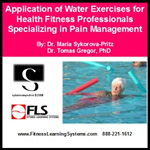
By Maria Sykorova-Pritz Ed.D and Tomas Gregor PhD
The number of people suffering from chronic pain conditions is growing indicating a need for effective chronic pain management programs. Chronic pain associated health care costs is estimated to be $80 billion each year in the USA alone. People suffering from chronic pain need to be fully educated about the process of managing pain. Knowledge is power for the chronic pain sufferer. With the information and techniques presented in this course, you as a health-fitness professional can increase your client's ability to manage chronic pain.
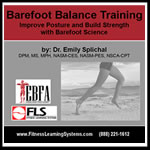
By Dr. Emily Splichal DPM MS MPH NASM-CES NASM-PES NSCA-CPT
In closed chain kinematics the foot is the foundation to human movement. This means that any dysfunction in the foot must impact knee, hip and lower back alignment. Conversely, in open chain kinematics, hip strength controls knee and foot posture. Learn one of the most effective techniques for improving foot posture, controlling knee pain and strengthening the hip. After this course you will fully appreciate the power of barefoot work. Improve posture and build strength - with barefoot balance training.
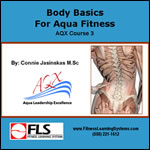
By Connie Jasinskas MS
Body Basics for Aqua Fitness is designed to give you fundamental knowledge about functional anatomy, kinesiology, and physiology related to vertical aquatic training (aqua fitness). This course (AQX Course 3) explains muscle roles and priorities, key training principles, as well as physiology of vertical immersion. Over 71 videos and several interactive and printable activities. Whether you are working with sports teams, post-rehabilitation groups, aquatic personal training, or seniors' group aqua fitness, Body Basics for Aqua Fitness is fundamental to your success.
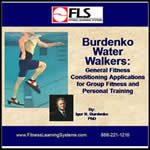
By Igor N. Burdenko PhD
Looking for something new in the water? The Burdenko water walking program is just what you need for group, personal training, or rehab. This program based on the Burdenko Method contains unique exercises using the Burdenko water walker equipment. The program is different, functional, maximizes time efficiency, and makes exercising fun. It is easy to remember, and mimics some sports movements. Videos and text give clear instruction for each exercise. Your clients will love these unique exercises that can make up an entire workout, or be mixed with other more traditional exercises.
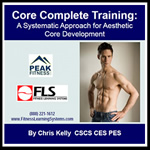
By Chris Kelly CSCS CES PES
Part 2 of Chris Kelly's core series is an evidence-based tested core training program designed to build a strong and aesthetically pleasing mid-section combined with the ability to function efficiently in the real world. Through video and text you will learn the purpose for different types of unique core training exercises and methods to expand your "tool box." Learn to progressively increase the challenge of your training programs for clients of all levels and take the entire core (versus merely the abs) to a new level of function. Part 1 Restore the Core: Integrated Core Training for Real World Function is available through Fitness Learning Systems.
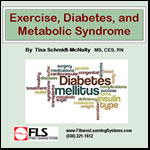
By Tina Schmidt-McNulty MS, RCEP, RN
According to the American Heart Association, over 47 million Americans have metabolic syndrome. That is approximately one out of every six people. Every health-fitness professional will encounter diabetic clients. This course will help prepare you to effectively work with these clients on many levels. Scenarios are included to help you prepare for inevitable diabetic incidents with clients.
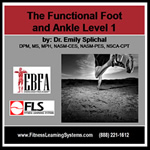
By Dr. Emily Splichal DPM MS MPH NASM-CES NASM-PES NSCA-CPT
The organized actions of the foot and ankle complex is often overlooked and misunderstood in the health-fitness industry. This adaptive lever plays a role in every upright action from human locomotion to squats and lunges. With the advancement of the fitness industry and expanding role of the fitness professional there is greater likelihood of encountering a client with foot pathology or foot compensations. To remain competitive among your colleagues and to achieve the best results with your clients, it is imperative to gain an understanding of the role the foot and ankle play in creating and modifying fitness programs. This course contains pictures and videos to help you understand biomechanics, assess foot conditions, and better understand how the foot and ankle play a role in every step you take.
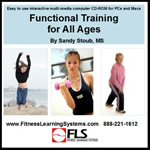
By Sandy Stoub MA
Learn how to apply and incorporate Activities of Daily Living (ADLs) into training formats for all ages. The application of multiple strategies, drills, and methods of training allow individuals of all ages to become functionally prepared for life. Multi-plane and multi-sensory methods will be addressed through a science-based, practical approach to understanding an integrated body concept. There are sample programs, sample combinations, and video to guide you through the concepts. Freshen your training and group fitness sessions by adding some practical functional elements.
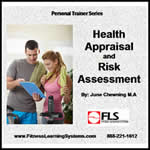
By June M. Chewning MA
Health Appraisal and Risk Assessment set the stage for legal responsibility to your client and enable you to limit liability exposure as a health-fitness professional. Understanding this process and using it correctly aligned with industry standards will help you properly screen your client for potential risk. This course teaches you how to navigate through the process dictated by the American College of Sports Medicine Guidelines. It includes several printable assessment forms and covers many important topics that all health-fitness instructors must understand to practice within industry standards.

By Tina Schmidt-McNulty MS, RCEP, RN
Heart disease and its complications is the leading cause of death in the US for both men and women. Exercise plays an important role in prevention and treatment of heart disease. This course explores risk reduction, prevention, and management of heart disease through lifestyle changes and exercise. Learn how to safely and effectively lead your clients to a healthier heart and a healthier life.
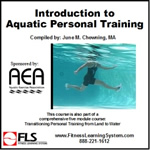
By Aquatic Exercise Association
If you are a personal trainer interested in expanding your training options to the water, it is important to learn about the aquatic environment. The water's viscosity provides resistance that surrounds you and provides "work" for every movement in every direction. The water's buoyancy reduces body mass, impact to weight bearing joints, and spinal decompression in deep water. The water's hydrostatic pressure affects many of the body's physiological functions. If you want to be an effective aquatic personal trainer, learn about the special benefits and qualities the aquatic environment has to offer and incorporate that knowledge into your personal training sessions. This course will start you on your way to becoming a successful aquatic personal trainer.

By Soraya Cates Parr BS, CPT
Chronic lower respiratory disease, primarily COPD, was the third leading cause of death in the United States in 2011, according to the CDC. Also, the number of people with asthma continues to grow. Learn guidelines for working with pulmonary dysfunctional clients, breathing exercises, and how to help overcome the fear that accompanies an increased demand on the respiratory system. Learn how to effectively help these clients improve function and quality of life.
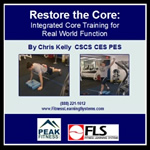
By Chris Kelly CSCS CES PES
Having a strong mid-section is not only aesthetically pleasing but contributes substantially to overall health and stamina as well. Understanding how to progressively and safely restore the core for your client will build a foundation for supporting the spine and improving overall function in both athletics and activities of daily living. Through video, text and informative pictures, Chris Kelly will teach you how to assess your client's core strength and provide several unique and enjoyable exercises to build your client's most important foundation- Core Strength and Function.

By Gregory J. Keyes PhD CMC
As a health-fitness professional you are constantly under the scrutiny of your clients and employers. As a result you must continually look at methods to enhance your ability to communicate, understand, and motivate your clients. This course shares a multitude of skills and knowledge that will help develop all who present or teach in group or one-on-one settings to ensure your professionalism remains "top of your game." Use these skills to provide an example of leadership that other health-fitness professionals want to emulate.
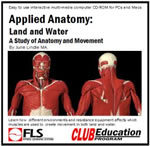
By June M. Chewning MA
Applied anatomical movement can be confusing for any health-fitness professional. This easy to use multimedia course advances your knowledge of basic human movement, muscle use, types of contractions, and the muscle equation for both land and water environments. Deepen your understanding of concentric/eccentric action as it pertains to specific movements and equipment use on land and in water. Gain confidence in understanding the purpose of every exercise you prescribe so you can provide safe and effective programming for your group fitness and one-on-one clients.
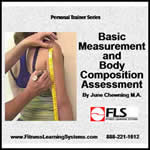
By June M. Chewning MA
Fine tune and expand your basic assessment skills. This multimedia course takes you through the basics of resting heart rate, resting blood pressure (video included), height, and weight measurement. Read descriptions and view video clips to locate and measure ten skinfold sites and nine body circumferences. Formulas and equations for Jackson/Pollock and a seven-site body composition, BMI, and calculations for recommended weight ranges. Build your knowledge and confidence to retain your clients with accurate basic assessment options.
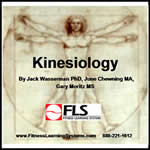
By Jack Wasserman PhD, June Chewning MA, Gary Moritz MS
Increase your understanding and professionalism by expanding your knowledge in human movement. This course contains text, photos, interactive graphics, and video to help you deepen your knowledge for the fundamentals of human movement and the unique way each person moves. Make each exercise work for your clients. Develop your ability to effectively understand and modify exercises in order to personalize an exercise movement or routine.
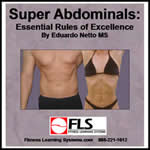
By Eduardo Netto MS
Core and abdominal strength/endurance are the foundation of all human movement. Learn how to train abdominals efficiently with proper exercise execution in this course. See videos and explanations of abdominal anatomy, proper training technique, and exercises for on land with bonus exercises for in the water. This course helps you build your knowledge and skills for training this fundamentally important part of the body.
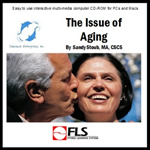
By Sandy Stoub MA
This course provides an important overview of aging through physiological, psychological, and sociological perspectives. With a thorough understanding of the aging body, a health-fitness professional can design effective programs to meet the needs of students. Videos and exercise descriptions are included for chair and standing exercises as well as exercises for in the water. Meet the demands of this growing population with safe and effective exercise options.
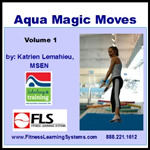
By Katrien Lemahieu MSEN
Over 100 videos of new moves!
You will never run out of aquatic moves and variations for personal training or all levels of group fitness with this exceptional choreography course by Katrien Lemahieu. You are provided with dozens of variations for three base moves: a Jumping T-Jack, a Soccer Jog, and a Tango Twist. Variations include leg variations, arm variations, additional variations, and crazy combinations. Special attention is placed on basic knowledge and careful consideration for safe and effective transitions in the aquatic environment. This course is packed with videos to help you with pool and deck instruction, and to help you see and practice these innovative moves. You will never approach your aquatic exercise choreography the same!
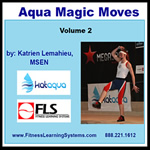
By Katrien Lemahieu MSEN
Over 100 videos of new moves!
Welcome to the second Aqua Magic Moves course! Aqua Magic Moves is designed to help instructors combine arm and leg patterns and make them into new exercises. They have the Magic to be executed in so many different ways that you will never run out of choreography ideas. There is theory included, cue recommendations, and other information you can use to execute the moves and understand the philosophy behind the system. You are provided with dozens of variations for three base moves: a Circle Ski 3, Corner Kick, and Rocking Mambo. This course is packed with videos to help you with pool and deck instruction, and to help you see and practice these innovative moves. You will never approach your aquatic exercise choreography the same!
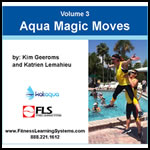
By Kim Geeroms BS and Katrien Lemahieu MSEN
Katrien Lemahieu is back at it again for Aqua Magic Moves 3 teaming up with Kim Geeroms. Kim and Katrien (K2) provide a unique way to construct aquatic choreography that results in "magic moves" which can be used in choreography for the unfit through trained athletes. You can adapt these moves to your client base, intermix them into your existing chorography for an extra challenge, or use them to promote coordination to "train the brain." There are so many options for using Aqua Magic Moves that you will never run out of choreography ideas and challenges. Over 50 videos to help you learn the moves!
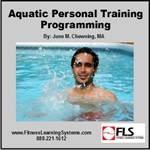
By June M. Chewning MA
If you are a personal trainer interested in expanding your training options to the water, it is important to learn about the aquatic environment. Increase your success by understanding the properties of the water and aquatic physiological responses. This course teaches you training formats that work well in the aquatic environment as well as shallow and deep water exercise techniques. It also addresses the proper way to monitor and manipulate intensity in the aquatic environment, a skill critical to the success of your client reaching his/her goals.
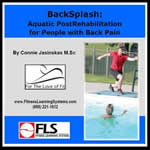
By Connie Jasinskas MS
Over 80% of the U.S. population suffers from low back pain at some time in their life, some with chronic low back pain issues. Most low back pain is attributed to muscle imbalance and is relieved and prevented by a properly executed exercise program conducted by a knowledgeable professional. This course shows how vertical aquatic exercise can be used in post-rehabilitation for back pain by aquatic rehabilitation practitioners, as well as aquatic leaders providing individual or group exercise for this population. Videos and pictures give you a clear understanding of the exercises and progressions shown in the course. If you want to get exceptional results with your back pain clients, this course is a must!
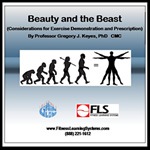
By Gregory J. Keyes PhD CMC
Exercise demonstration and prescription is a topic that every health-fitness professional needs to constantly consider and can often be neglected due to experience and complacency. This could result in inadvertent poor example/demonstration techniques, and less than optimal planned prescription. These morsels of tips, hints and in some cases in your face frank observations for group, small group, and personal training applications are shared to ensure your professionalism remains top of your game and keeps your clients coming back for more.

By Dr. Emily Splichal DPM MS MPH NASM-CES NASM-PES NSCA-CPT
Almost 80% of American adults will suffer low back pain at some point. Interestingly, 70-80% of low back pain is associated with musculoskeletal imbalances and improper core activation during everyday movement. Join us as we take a look at the latest research on the biomechanics of low back pain. From the hip to the foot, you will be surprised by how many different imbalances attribute to low back pain. Help your clients get their bodies back in balance and move pain free!
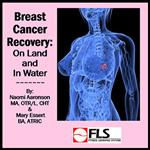
By Naomi Aaronson MA OTR/L CHT and Mary Essert BA ATRIC
There are over 2 million breast cancer survivors in the United States today. Due to the ramifications of treatment, exercise is a modality that can be used to facilitate recovery. Numerous studies have demonstrated that exercise can improve quality of life, reduce side effects of treatment, and improve strength and endurance. This course will help health-fitness professionals understand diagnosis, treatment, and ongoing care for cancer patients and survivors. Important guidelines and information are provided for safe and effective exercise through course and multimedia content. Embrace this client base with practical exercise options to improve recovery and function.
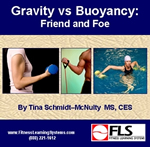
By Tina Schmidt-McNulty MS, RCEP, RN
Explore the basic properties of gravity and buoyancy and how they affect movement and equipment use on land and in the aquatic environment. Exercise and equipment options are given for all primary muscle groups for land and water resistance training exercises using weights, tubing, buoyant and drag equipment. This course is an easy to access, comprehensive library of resistance training exercises with over 70 videos, written explanations, variations and safety information beneficial to both land and aquatic health-fitness professionals.
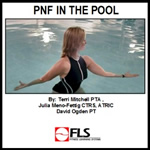
By Terri Mitchell PTA, Julia Meno-Fettig CTRS ATRIC, David Ogden PT
PNF is characterized by mass movement patterns that are spiral and diagonal. You use PNF patterns of movement and components of them in most of your functional daily activity. This course offers basic educational information regarding proprioceptive neuromuscular facilitation techniques appropriate for performance in the aquatic environment to use with all levels of clients. See text, photos and video demonstrations as the authors teach PNF movements for use in therapy and fitness environments, one-on-one or in group fitness applications. PNF training helps your clients maintain important functional movement patterns.
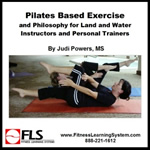
By Judi Powers MS
This course introduces the teachings and movements of Joseph H. Pilates. It outlines the popular neuro-muscular floor exercises that stretch and strengthen muscles and promote better posture, using science to better understand the core and stabilizing techniques used in this type of training. Add these exercises to your tool bag to provide diversified programming for your group and one-on-one exercise applications.
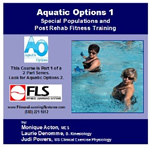
By Monique Acton MES, Laurie Denomme B Kinesiology, Judi Powers MS Clinical Exercise Physiology
This course is the first module of a two-part series. Aquatic Options was specifically designed for aquatic fitness professionals, Personal Trainers, Physical Therapy Assistants, Occupational Therapy Assistants, Recreational Therapists, and any professional working with special populations and post rehab individuals in the aquatic environment. This course will review important fitness training guidelines and help you better understand how to integrate progressive aquatic fitness exercises for shoulder, knee and hip orthopedic considerations and low back pain.
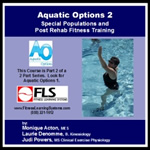
By Monique Acton MES, Laurie Denomme B Kinesiology, Judi Powers MS Clinical Exercise Physiology
This course is the second module in the Aquatic Options series. Aquatic Options was specifically designed for aquatic fitness professionals and any professional working with special populations and post rehab individuals in the aquatic environment. In this course you will learn modifications for participants with specific medical conditions including arthritis, diabetes, hypertension, and obesity, and be introduced to the assessment, evaluation, documentation, and reporting process. Choose appropriate equipment for all of the populations, and be able to design your own safe and effective aquatic fitness programming.
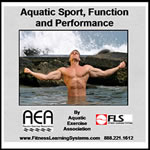
By Aquatic Exercise Association
Whether designing aquatic programming for the professional athlete, the "armchair" athlete, or somewhere in between, this course will provide numerous options for improving performance and functional capabilities using creative and carefully developed aquatic exercise. The focus is on formatting for optimum efficiency in relation to a variety of student goals: sports related, recreational activity, or daily function. Participant goals, muscle involvement and equipment interaction are considered, along with movement patterns to improve performance and enhance exercise retention at any level of activity or sport.
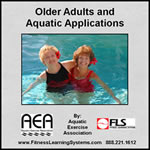
By Aquatic Exercise Association
Older Adults comprise the fastest growing segment of the American population and aquatic exercise can help them maintain functional fitness and independent living skills. A thorough review of the physiological aspects of aging in this course will introduce aquatic fitness professionals to important considerations for providing safe and effective programming for the older adult population. This course includes programming and exercise descriptions with videos for three levels of senior aquatic programming to help you reach the needs of ALL older adults!
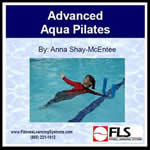
By Anna Shay-McEntee
Advance your client's development of correct breathing technique, body awareness, body alignment and body placement in the execution of Advanced Aqua Pilates exercises. The results are improved core strength, control, stability and flexibility. Excellent videos, images, and exercise explanations are included to help you teach these exercises for maximum results. Provide your clients with variety and diversity with Advanced Aqua Pilates exercises. (Also see Essential Aqua Pilates.)
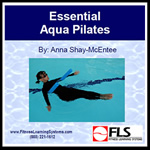
By Anna Shay-McEntee
Pilates and Aqua exercise are two of the fastest growing exercise programs in the world. They offer programs to suit the exercise needs for people of all ages and all levels of fitness. Pilates performed in the water engages the upper and lower extremities through optimal ranges of motion while minimizing stress on the joints, resulting in a unique combination of exercise and physiotherapy. Learn how to teach correct breathing technique, body awareness, body alignment and body placement in the execution of these unique exercises. Excellent videos, images, and exercise explanations are included to help you teach these exercises for maximum results. Provide your clients with variety and diversity with Essential Aqua Pilates exercises.
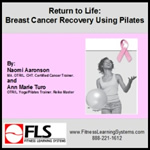
By Naomi Aaronson MA OTR/L CHT Certified Cancer Exercise Trainer, Ann Marie Turo OTR/L Yoga/Pilates Instructor Reiki Master
Cancer is a disease that affects both mind and body. More and more cancer survivors are coming to health-fitness professionals to regain strength, mobility, and endurance. Pilates principles and movements are great for restoring function to Breast Cancer Survivors. You can incorporate these principles for your group fitness and personal training clients without being certified or highly experienced in Pilates. This course provides sound information about breast cancer and its process, along with several exercise video clips to aid you in working with breast cancer clients to help them regain a connection to their body. Use these principles to facilitate your cancer survivors' "return to life."

By Gregory J. Keyes PhD CMC
Human anatomy and physiology is like climbing a ladder- you take it one step at a time but you never reach the top of this ladder. The human body is so complicated. Review of basic knowledge is critical to continued effective practice. Go on an entertaining journey of the 11 systems of the body with Dr. Keyes where he relates the human body to a motor vehicle. Great base review material with interesting body facts included to help make this vital information stick.

By Robert Raymond BS and Derrick Wilburn BS MBA
How would you like to have a thriving client base in just 90 days?
The fitness business information, practical steps, and detailed advice outlined in this course will provide anyone in the personal fitness coaching business a 90-day success plan for obtaining a client base. Manage time effectively, develop a client base, and commit both time and energy to growing a personal training business.
| 
